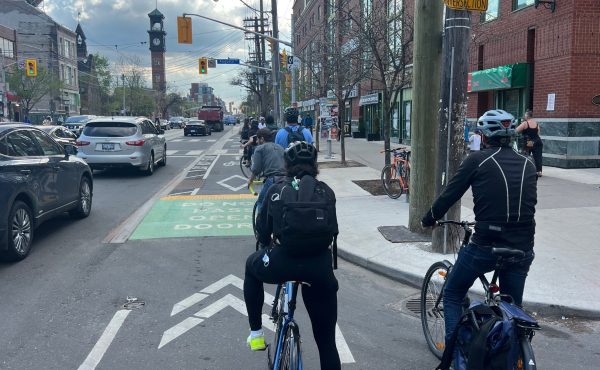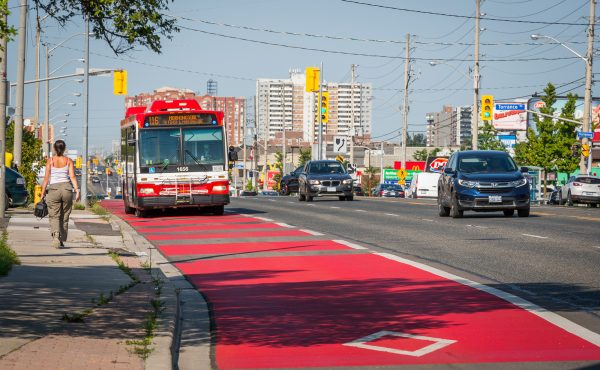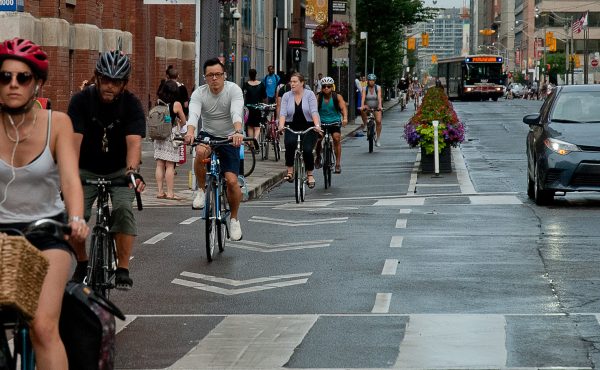click on cartoon to view larger.
The Globe and Mail really impressed me with its editorial cartoon today.
There is actually a petition for the promotion of cycling in Canada, which asks the federal government to provide a tax credit for commuter cyclists. It now has over 4,000 signatures. It was started by this fellow called Tuco. There is also a full article about the petition in the excellent magazine; Momentum.
(More news on the federal budget can be seen here.)





16 comments
One would think it would be hard to distinguish between a bicycle owner and a cycling commuter… who would be keeping tabs on whether and how much someone was actually commuting with their bicycle? Answer is at the petition site linked to in the article:
“Steps which we feel would achieve this include:
a) Offering a tax credit to bicycle commuters similar to that offered to public transit users. Cyclists would be required to have their employer verify that they commute to work by bicycle, and would then be given a credit based on the value of the C02 emissions they would have released into the atmosphere had they driven a car to work.
b) Setting up a program similar to Britain’s “Cycle to Work†initiative. In this program the employer purchases a bike and related accessories for an employee who wishes to commute to work by bicycle. The employer then claims the taxes back from the government, and sells the bike to the employee at the tax-free price over an extended period of time with small deductions from the employee’s paycheque.
c) Offering tax incentives to employers which set up bike lockers and showers for employees who wish to cycle to work.
d) A removal of GST from bikes and bike accessories.
These steps and others can promote cycling as a transit alternative”
Why are we looking for “transit alternatives”? Shouldn’t we simply be looking for car alternatives? I can’t help think that better and more stable transit funding would reach more people (and much more diverse people at that) without the expedient of The Employer looking over your shoulder checking up on you. The health and fitness argument aside, hell if a metropass was $40 I might be convinced to give up my bicycle commuting! And that wouldn’t be such a bad thing for anybody. The cycling boo-birds will hate me, but transit is the only urban transportation solution that can address everybody’s needs – cyclists already have the incentives of the cheapness of their mode, and the excercise they get.
If we’re supporting cycling, far better to put this money into better and more comprehensive bike lanes and public cycling facilities.
I don’t think that Tuco meant mass transit alternatives, just alternatives. I am sure he will post later on to clarify.
Robin, I was just about to complain about why I don’t cycle commute into work when you mentioned Britain’s incentives. Great idea, especially about incentives for showers and bike/regular lockers at workplaces. Coming in with a gleam of sweat and wrinkled up work clothes in my backpack is the number one reason I don’t cycle commute into work.
I wish our government was open to more creative tax incentives like this. `
Well, the petition wasn’t perfect, and maybe could have done with a couple more editing sessions, i.e. to iron out problematic phrases like “transit alternatives”, but at least it was a start.
As far as what “items” were asked for, bike lanes would obviously be a big one on the wish list, but they’re not really something to ask the federal government for – being more of a municipal responsibility.
In all honesty, I consider this petition to only be step one. It will get read in the House and largely ignored. We need twenty or thirty cyclists, or more, from across the country, to start petitions aimed at all levels of government in order to get anywhere.
Whoever writes the next one, let me know, I’ll sign.
A fair way to handle it would be impose a gas or carbon tax, whose revenue would be used to benefit all Canadians (lower income taxes and/or more government benefits). That way people who use inefficient vehicles a lot end up paying more, people who use efficient vehicles a little would pay less, and people who don’t own a car would have significant benefits.
It is much simpler to tax the one thing we don’t want people doing, rather then trying to find ways to pay them to do the many different things they could be doing instead.
Y’know, I’d be more than happy to live without the “tax credit” if there was some federal and/or provincial money made available for alternatives to automobile transit. The monthly-pass public transit credit is enough of a pain in the butt to deal with for someone like me who likes to keep the time I spend on my income tax forms down to a minimum. Rather seeing a tiny amount of money back in my pocket at the end of the year for taking the TTC or riding a bike, why not give that money to people who will build and maintain a better infrastructure? Heck, I’ll just spend it on beer and popcorn anyway.
No offence, but the reference to the cyclist needing checking up on by employers is stupid.
After all, what’s to stop me from getting a transit pass and claiming I’m using it–then taking the tax credit? What’s to stop me from buying a Prius for the $2000 tax credit then using my transit pass to go everywhere? Why should anyone care?
Same with a bike. If I go to the trouble to buy a bike, I should be credited the amount I spend on that bike (including maintenance) off my taxes. Regardless of the way I use the bike. Regardless of whether I have a transit pass too, and am getting a tax credit for my transit pass. Regardless of whether I own a hummer and am driving to the spit with my bike aboard and twirling around in carfree paradise, then roaring home up Leslie Street.
The other stuff makes sense–take the gst off alternative transportation.
And to say that a bike is less equitable than transit is dumb. Most people have poor access to transit, but everyone with a bike has equal access to their bike. A bike to York University is a lot cheaper than a subway line to York University.
Well, that depends how healthy and abled you are – cycling is overwhelmingly for the young, healthy and abled,(and when commuting), the dedicated – in essence, it is a highly elitist activity, despite the best attempts of cycling activists to claim it’s the last resort of the poor. If the poor really need better mobility and can’t afford transit, they should be given free or discounted transit passes. In Britain the elderly and disabled get free transit passes – I hardly think a sound transportation strategy is to somehow suggest the elderly, young and infirm should cycle everywhere instead.
When it’s 20 below and the vast majority of cyclists have given up cycling, you need a transit infrastructure in place to accommodate them, one that maybe won’t be used to capacity in fair-weather if a significant number of people are cycling instead. Again, a sound transportation strategy shouldn’t be focussed on assuming that cyclists in Toronto will commute by bike all year round. By all means, plan for cyclists, but let’s not pretend that cycling is some kind of replacement for transit (and I say that as a dedicated and nearly year-round cyclist).
I bike to work every day. I’ve biked to the York University area, and let me tell you, I never, ever, want to do it again, regardless of how large a subsidy I might get, or how nice the bike paths are. Given the current (and increasing) scale of our urban areas, you cannot assume that cycling can somehow solve all our problems. Better transit (and by extension, transit-oriented development) on the other hand, very nearly can.
Thanks for a great petition.
Likely the first to be read in Parliament.
Sweet. You rock!
Let’s face it.
If you love Toronto, you walk or ride a bike.
“Let’s face it.
If you love Toronto, you walk or ride a bike.”
Not to sound too accusatory , but that quote (and some other comments here) do sound like they come from a elitist downtowner mindset.
Do people wo take the TTC not love Toronto? There’s quite the local affection for the TTC, even though it does let us down from time to time. As has been pointed out, cycling isn’t for everyone, and not that many can afford to live close enough to walk to work. I absolutely love Toronto, and enjoy the freedom a Metropass gives by exploring the inner city by streetcar and the suburbs by bus and discovering all sorts of neat things. That’s loving Toronto.
I’m about to buy a bike again, though I’m not sure how much I’ll use it for commuting, though I can’t wait to get back on the streets, and would love to see more bike lanes. I live in North York and work at Queen and Yonge. Maybe the new bike racks on the buses (one way to help to accomodate cyclists going long distances or in inclement weather) will help make it easier, but I’m still probably not going to do it in the winter in the snow and freezing rain and cold.
I agree that by far the easiest way to handle the “tax credit” part of the petition is to forget giving any sort of “handout” and just penalize people for what are considered bad habits instead – i.e. no public transit credit, no cycling credit, but instead start raising gas taxes to european levels.
When I was offering comments on the petition on my blog back in November we discussed this very thing:
http://tucorides.blogspot.com/2006/11/as-americans-go-to-polls.html
I actually think someone should start a “please raise the gas tax” and “use the money for public transit and bike lanes” petition, and am thinking of doing one myself – BUT – this one was meant to be a PRO-CYCLING petition and I decided to leave out the gas tax idea.
The “give cyclists a tax credit” is only one item out of four, and yes, it is probably the least likely one to have happen. However, the four suggestions put together are actually of less importance than the fact that cyclists need to make their voices heard.
Someone start a gas-tax petition, someone start a “reduction in car sizes” petition, someone start petitions for all these things:
“A rigorous analysis of all cyclist fatalities over the past decade; expansion of the city’s personnel capacity to plan and build bicycle facilities; stronger design standards for safe streets; introduction of 15 mph streets; changes to the city traffic rules to prevent “dooring†incidents; public education of motorists as to cyclists’ rights and drivers’ responsibilities; a requirement to retrofit large trucks with side guards; prioritization of bike routes for inspection, pothole filling and hazard elimination”
like i’ve said, I’ll sign.
Yup, great cartoon.
While bikes don’t work for everyone, we’ve got so much more we could and must be doing. But we’ve got rather entrenched “carruption” and yes, those tilting at windshields do get breakthroughs, despite people like Peter Milczyn and Rob Ford, and yes, some dork cyclists.
TTC is just fine. Do the best you can. Many people commute on bike or walk for great distances.
Chubb has a good idea: give free transit passes to the elderly and disabled. As has been indicated elsewhere, “disabled” by definition includes anyone who drives a car (the car is by definition an “assisted mobility device,” therefore anyone who needs one is disabled). Free transit passes to everyone who drives a car: drive a car, get a transit pass. Likes it. Likes it a lot. Only problem is enforcing the use of transit. If people receive a transit pass, they must use it, and only it, to get around. Exceptions will be made for those who must walk to the transit stop.
Yes, we will hear arguments against this: “But once they stop driving, they will no longer be disabled. Then only the elderly will receive transit passes!”
The solution is simple. We must lower the age at which people are considered elderly. Let us extend benefits of the elderly to anyone over the age of 16. At age 16, you’re eligible for a driver’s license. At that point, you’re also eligible for a free transit pass. This will take care of everything. The only people on the roads will be cyclists, pedestrians (walking to the bus stop) and buses.
Now, let the naysaying begin! Just remember: if you’re not with us in the fight for transit everywhere, all the time, you’re with the terra-ists.
–blobb
Yes, a gas or carbon tax perhaps. But how about taking away all the free parking perks employers provide or at least tax them? I’m sick of subsidizing the ninnies at work who think free parking is their God-given right.
How about offering employers incentives to hire local workers i.e. to hire an individual that lives in the city that the individual wishes to work in – instead of offering commuters tax incentives to continue commuting?